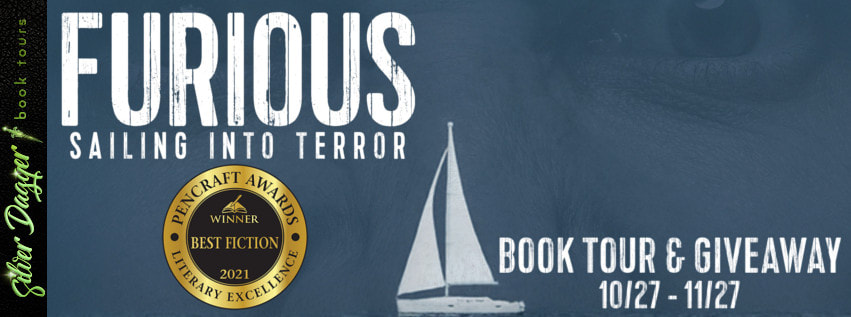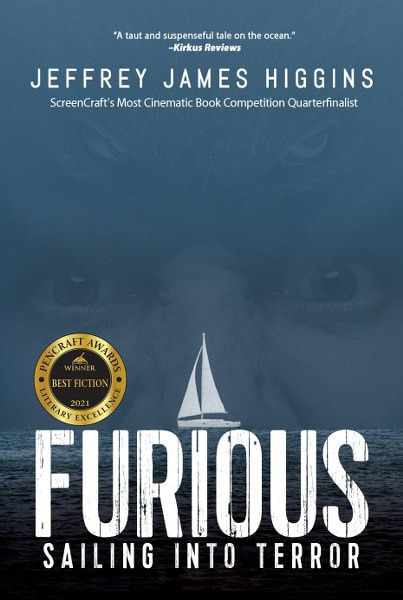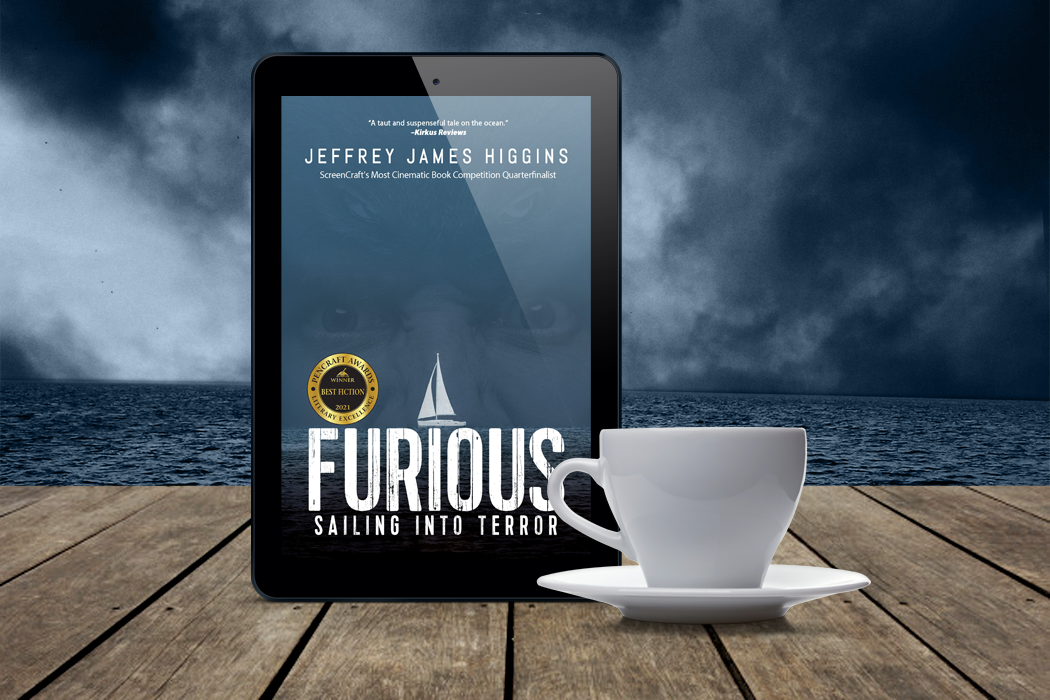"An extraordinary achievement by a writer destined for greatness." –Jon Land, USA Today bestselling author of the Caitlin Strong novels
"A gripping tale of a dream vacation that goes horribly wrong." –Mark Alpert, internationally bestselling author of Saint Joan of New York
Trapped on a storm-damaged yacht, a grieving woman must conquer her worst fears and fight for her life, in a story described as The Shining on a yacht.
Dr. Dagny Steele is on the verge of fulfilling her lifelong calling to become a pediatric surgeon when the sudden death of her daughter sends her into a crushing depression. Grief stricken and desperate to heal, she takes a leave of absence and sails across the Indian Ocean with her husband. Dagny begins to recover from her tragic loss when her voyage turns into a nightmare.
Isolated and hunted at sea, can she survive a deadly crucible?
EXCERPT
I wanted to die.
I leaned into the crib and brushed my fingers over Emma’s teddy bear, a stuffed animal larger than she had ever been. The velour fabric felt cool and still—the opposite of Emma during her short life—her three-month, impossibly brief existence. She had come and gone so quickly; it was almost possible to imagine she had never lived at all. Almost. Some mornings, I awakened and experienced a few seconds of peace, before remembering what had happened, then reality would rush into me like a cold wind.
My baby girl is dead.
The teddy bear’s stitched eyes stared back at me. I had been so careful buying non-toxic bath toys and dolls free of choking hazards. Every object in the room was childproof, from the one-inch gaps between crib slats to the electrical outlet covers. I had given it all so much thought.
A tear wet my cheek, smearing my mascara, and I hugged the teddy bear against my chest. I could still smell the sweet, floral scent of baby powder, and I pictured the first time Emma smiled at me—her cheeks fat and rosy.
My eyes burned, and the crib blurred in my vision. The floor shifted under me, as if the carpet had transformed into desert sand, and the world rushed past me, moving on without me, jostling me like a leaf blowing down the side of the road, without direction, without hope.
I reached over the crib and caressed a cloth elephant dangling from a mobile. I flicked it and the mobile spun in a circle—going nowhere— as it chimed Twinkle, Twinkle, Little Star. Emma had giggled every time she heard it.
My pregnancy had been unplanned and the months before Emma’s birth had been a flurry, a frantic rush to prepare for motherhood. We painted the nursery and purchased a crib, stroller, and pacifiers. I took vitamins and read how-to books, all so we would be ready when she came. Then she arrived, and everyone wanted to see her, touch her, share our joy. For three months she consumed our thoughts, our every waking moment. Then she was gone.
She had my blonde hair.
My knees buckled, and I wanted to fall through the floor, sink into the earth, lie with Emma in her grave. I wanted to hold her, kiss her, love her. I could not comprehend the unfairness of it, the cruelty. She had been healthy and full of life until the morning I found her cold and still.
Sudden Infant Death Syndrome. How could that be a real thing? How could anyone allow it to happen?
I gripped the crib to steady myself.
“Are you okay?” Brad asked from the doorway.
My body stiffened. I had forgotten my husband was home and the need to hide my weakness from him overwhelmed me. I turned away so he would not see my tears. I pulled my shoulders back and straightened, hoping I would not topple over.
“What do you think?” I asked. My voice sounded foreign, like a soundtrack dubbed by an actor.
“I have something to show you.” “Not now.”
“Dagny, this isn’t helping.”
“I said, not now.”
He touched my hand, and I pulled it away.
I knelt and ran my fingertips over the crib bumpers, designed to keep Emma from banging her head against the wood. I had chosen the tea rose color for its calming effect. Had they contributed to her death? Brad and I were both surgeons, but we had not seen it coming, could not save her. I wanted to climb into the crib and pull the blanket over my head until the world disappeared. Until I disappeared.
“Did I lay Emma on her back?” I asked, still not making eye contact. “We’ve been through this.”
“Was the baby monitor turned up?”
“You know it was.”
“Did I do something wrong?”
“Dagny, please.”
“Did you?”
Brad glared at me. “You have to stop.”
Bunny rabbits smirked at me from a mural painted on the wall. I had been overconfident, unprepared. What did life mean if an innocent child could die for no reason? My life became a pause, a question mark, a purgatory waiting for an explanation.
“I could call the medical examiner’s office or Detective Fuller again,” I said.
“You’ve called them at least once a week for months.”
“They’ve stopped returning my calls.”
“Their investigation is over. Sometimes children die and we never know the reason.”
“I still need answers.”
I had always been an optimistic person, able to see the positive side of things, instinctively searching for ways to be happy. Not now. I still had that person inside me, but she was underwater, struggling to reach the surface, thrashing her arms and legs as her air ran out, trying to reach the light. All I could do was watch her, like a disinterested passerby on the beach, not knowing if I wanted her to make it or not.
Groaning emanated from somewhere, deep and guttural, and it took a moment to realize the sound came from me—as if my soul had taken control of my body and cried out for this nightmare to end. Life had broken on an elemental level, beyond repair. My baby was gone forever.
“Come on,” Brad said. He took my hand and led me out of the nursery.
I did not resist.
He turned to me. “There’s something I need to talk to you about. Wait for me in the sitting room.”
“Talk about what?”
“I have to get something from my office. Wait for me.” An order, not a request.
I walked downstairs and stood in front of our bay windows, not out of curiosity or because Brad had asked me, but because I could not think of anything else to do.
A minute later, Brad hurried into the room with an envelope in his hand. He smiled. Not really a smile, but more of a failed attempt at one. His lips pressed together, and his cheeks rose, but the corners of his mouth turned down—both a smile and a frown—his frustration molded into a mask. His expression told me he had reached the boundary of his patience. He wanted my grieving to stop, needed my pain to end, craved his life back. He had found a way to move on, the ability to breathe again, and I had not.
“Hey, Dagny. How are . . . uh, I think you will like this.”
I glared at him. Emma had only been gone for six months, twice as long as she had lived. I resented his resiliency, which was not fair to him, but I did not care. Life was unfair. Emma’s death was unfair. The end of my happiness was unfair.
“Have a seat,” Brad said, his voice gentle, solemn, like the funeral director who had helped me pick out the casket. “I think I know how to help you . . . to help us. I have an idea to break you out of this—”
“Come and sit down.”
I followed him to the couch in the center of the room. It was a cavernous space, in a massive house, on an expansive estate. Brad had bought this mansion with his family’s money and surprised me the week before we married, four months before Emma’s birth. The beauty and opulence of the house matched the other homes in Newton, Massachusetts, but it was not Boston, not the city where I had spent my entire life. Not my home. It had all happened too fast—the dating, the unexpected pregnancy, the house, the marriage. The death.
I sat on the couch and peered out at the autumn tableau. The leaves had turned crimson, vermillion, arsenic-yellow. They were dying too.
“What is it?” My voice sounded distant, cold.
“It’s been six months, and you’re almost finished with your surgical fellowship,” Brad said. “You need to . . . we need to dig our way out of this and live again. We need to—”
“How long am I allowed to be sad, Brad?”
“I’m not saying you can’t grieve, but you have to move on. This has been hard for me too.”
“Has it? You seem to have recovered quickly.” What a mean thing to say. Who was this person who had taken over my body after my soul departed?
“It’s been awful, unthinkable, but I pushed through the pain. Damn it, she was my daughter too. I’m trying to help you.”
“Sometimes I think about taking pills, making it all stop,” I said.
He slammed his hand on the back of the couch. “Fuck this. You don’t think I’ve felt like dying too?”
I glared at him, silent. There it was. The anger always bubbling just below the surface. It had broken through and filled the room, like gas from a tar pit—foul, ugly, toxic.
“I . . . I didn’t mean to yell,” Brad said. “This has been unbearable. We have to do something.” He rolled his eyes to the ceiling.
I used to see that expression as a window into the mind of a brilliant doctor, but no longer. That was probably unfair too. Maybe I wanted someone to blame, and Brad’s proximity made him a convenient target. Maybe not.
He held the envelope out for me, but I did not take it.
“What’s that?”
“Plane tickets. Tickets to Bali. I leased a sailboat . . . a yacht, actually. We will sail from Indonesia to the Maldives, off the coast of India. Just the two of us.”
I gawked at him and blinked. “You think I want a vacation?”
“It’s not a vacation. It’s one month at sea, away from Boston, away from our lives . . . away from all of it.”
“You know I’m afraid of the water.”
“You don’t have to swim. We’ll be on a sixty-two-foot yacht.” “I haven’t sailed since I was a child.”
“I’ve been sailing my family’s yacht since I was twelve years old. I can do the heavy lifting, and if you’re interested, I’ll give you a refresher.”
“They’re expecting me back at Boston Pediatric,” I said.
“They’ve been expecting you back for months, and I don’t see you returning anytime soon. You need to get your head together before you can finish your fellowship and pass your boards.”
Brad’s answers came fast, as if he had given his plan great thought, prepared for my objections. I wobbled on my feet like a punch-drunk boxer, unable to respond to his counterpunches.
“I don’t know.”
“Trust me, the change of scenery will be therapeutic. I need this. We need this. You have to come.”
I looked out the window at the fallen leaves swirling on the lawn. Swirling and swirling. Going nowhere. Decomposing.
“When?”
“We’re leaving next week.” He stood, set his jaw, and stormed out of the room. Conversation over.
I opened my mouth to yell, to tell him not to leave, but instead, I leaned back on the couch and gazed out the window. How could Brad plan a month-long voyage without my consent? I felt like I had no say in the matter, no right to object. Adversity seemed to have brought out the worst parts of his character. He had grown more pedantic in recent months, assuming an unearned authority in our relationship. It seemed as if by succumbing to depression, I had abdicated my standing in our partnership. He had grown more domineering, consulted me less, treated me like a child, as if he knew best. I had serious doubts about that—serious doubts about him.
Outside, the car door slammed. The engine started and Brad drove past the windows and down the long driveway. The iron gates creaked open, and I watched him turn left, driving past brick mansions, stone walls, and velvet lawns. Leaves fluttered in his wake.
I did not care where he went.
I had done nothing but mourn for six months, the longest period of inactivity in my thirty-two years. I did not recognize the weeping woman I had become—unable to work, unable to socialize, unable to cope. I had always used my mind to overcome obstacles, but I could not think my way out of this depression. I could not move on after Emma’s death.
Maybe Brad’s sailing trip would give me distance from the psychological trauma, the space to get my emotions under control. If I did not recover soon, I would lose my pediatric surgical fellowship, lose everything I had worked my entire life to achieve. Forcing myself onto a sailboat would also make me confront my biggest fear, and if I could do that, I would become a stronger person. My trepidation entailed more than an irrational phobia—sailing across the Indian Ocean carried genuine risks. Ships sank, accidents happened, people died.
But I was desperate. Maybe this time, Brad knew best. He loved me and sailing across an ocean could be the change I required to recover. Maybe I needed this voyage.
I sat on the couch and pictured my father, the sun reflecting off the water, moments before it happened—twenty-one years ago. The day that defined my life.
I blinked the thought away and focused on the front yard. Leaves blew in circles across the driveway. The sun sank lower in the sky and shadows crept across the floor. The umbra climbed my legs, covering me, plunging the room into darkness. I watched myself sitting there, like I was that bystander on the beach.
I waited to see what I would do.
Goodreads ** Amazon ** B&N ** Black Rose Writing
About the author:
Jeffrey James Higgins is a former reporter and retired supervisory special agent who writes thriller novels, short stories, creative nonfiction, and essays. He has wrestled a suicide bomber, fought the Taliban in combat, and chased terrorists across five continents. During his career, he made the first narco-terrorism arrest, convicted the world’s most prolific heroin trafficker, and arrested an Iranian operative trying to acquire surface-to-air missiles. Jeffrey received both the Attorney General’s Award for Exceptional Heroism and the DEA Award of Valor.
Author's Giveaway




2 comments:
The Shining on a yacht? Now I must read this!
I would love to read your book.
Post a Comment